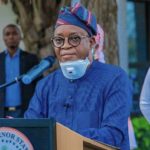President Bola Ahmed Tinubu inaugurated his cabinet on Monday with charge to the appointees to hit the ground running, CLEMENT IDOKO, writes on the onerous task ahead of the Minister of Education, Professor Tahir Mamman and Minister of State for Education, Dr Yusuf Sununu, in the efforts to transform the sector.
JUST as is often said that ‘uneasy lies the head that wears the crown’, the burden of charting a new course for the education that has been bedevilled with multifarious challenges has naturally fell on Professor Tahir Mamman who was on Monday, August 21 inaugurated as the 47th Minister of Education in Nigeria.
Expectations are high from the students, parents, staff unions and other critical stakeholders on Mamman, a professor of law and Senior Advocate of Nigeria (SAN), to deliver in the Renewed Hope Agenda of President Bola Tinubu as it affects the education sector.
Speaking when he assumed duties in his office at the Federal Ministry of Education, Professor Mamman, expressed determination that once the sector is fixed, every other thing would align for the growth and development of the country.
Mamman, alongside the Minister of State for Education, Dr Yusuf Sununu, assumed duties on Monday in Abuja, shortly after their inauguration by President Tinubu, and were received by the permanent secretary of the ministry, Andrew David Adejo, other heads of education parastatals and agencies and staff of the ministry.
He said: “If the education sector is fixed, every other thing will work perfectly in the country since the ministry is the foundation of all.”
Mamman, who solicited support from Nigerians to bring about the “desired change in the education sector,” noted that although the expectations were huge for the sector, President Tinubu was committed to turning the tide around.
On his part, the Minister of State, Sununu, sought the cooperation and understanding of Nigerians, especially the ministry staff in order to improve the standard of education in the country.
The state of education in Nigeria has been worrisome and of great concern to stakeholders, which is one of the reasons Professor Mamman will not just have a smooth ride on the driver’s seat.
He will be weathering the storm with his co-pilot, Dr Yusuf Sununu, who himself is a medical doctor (Obstetrician & Gynaecologist), a former House of Representatives member representing Yauri/Shanga/Ngaski Federal Constituency of Kebbi State.
Some of the challenges confronting education that the duo will be tackling, range from poor funding and crumbling infrastructure, incessant strike actions, poor teacher quality and alarming number of out-of-school children.
As it is observed, the Nigerian education system has suffered from inadequate infrastructure, with many schools lacking basic facilities such as classrooms, desks, and chairs. This has resulted in overcrowding, with some classrooms having up to 100 students per teacher. Many of the schools across the country are faced with the challenge of dilapidated buildings, lack of modern amenities to support effective teaching and learning.
Professor Mamman must therefore place premium on infrastructural development so as to create an enabling learning environment that fosters academic excellence and nurtures creativity.
Another critical challenge is the shortage of qualified teachers to teach children at the basic and secondary levels of education in the country. According to the 2018 National Personnel Audit (NPA) conducted on Public and Private Basic Education Schools in the country by the Universal Basic Education (UBEC), Nigeria has a shortage of 277, 537 teachers at the basic level.
The NPA report further indicated that while 73 percent of those teaching in public schools were qualified, only 53 percent of teachers in private schools were qualified to teach.
Efforts by the Teachers’ Registration Council of Nigeria (TRCN) to rid the sector of quacks and unqualified teachers has been largely unsuccessful because education is on the concurrent list and as it stands, some state governments recruit teachers based on political patronage. Private schools are the worst culprits as some of them recruit those they would be able to pay, thereby, sacrificing competence on the altar of mediocrity.
Poor funding has always been the major challenge in the education sector in Nigeria and stakeholders are unanimous in their agreement that Mamman has the onerous task of mobilising funds for the development of the sector. He must be ready to champion the cause for increased budgetary allocation to the sector. The United Nations Educational Scientific and Cultural Organisation (UNESCO) recommends 26 percent of a nation’s budgetary allocation to the education sector and Nigeria is nowhere near it.
Just as the vice president of National Association of Nigerian Students (NANS), Comrade Victor Ezenagu, has said, the new education minister must be ready to interrogate the heads of agencies and tertiary institutions and hold them accountable for resources allocated to them, block all leakages in the system and ensure that the funds voted to the sector get down the classroom in affecting positively teachers, students and teaching and learning environment.
He noted that this was the only way to ensure quality outcomes from the system away from the usual way of spending all the money on top level administration.
Also critical is the welfare of teachers across levels of education, especially in the area of remuneration and payment of entitlements to motivate them to give in their best that will translate into delivery of quality education. In this light, stakeholders have found the Minister as a “round peg in a round hole” having managed a private university as vice chancellor for several years, where there were no crises occasioned by demands for upward review of salaries and other issues.
The expectation of stakeholders is therefore for the minister to find a lasting solution to the lingering feud between the Federal Government and the Academic Staff Union of Universities (ASUU), including other staff unions in tertiary institutions. Recall that a lot of the issues that led to the prolonged strike by ASUU, which was called off late 2022 have remained unresolved and could possibly rear their heads.
The lecturers had asked for the release of revitalisation funds for universities, renegotiation of the 2009 FGN/ASUU agreement, release of earned allowances for university lecturers, and deployment of the University Transparency and Accountability Solution (UTAS) among others.
The lecturers, after losing their eight months’ salaries to the strike, were compelled to resume by the court while their concerns remained unresolved. ASUU President, Professor Emmanuel Osodeke in responding to the court judgment asking them to return to class, noted that lecturers could be forced to classroom but would be forced to teach. What this means is that students would bear the brunt either in form of extortion or excessive demands from the lecturers or half-hearted approach to their work.
Although there has been the controversy over exact number of school age children that are not in school in Nigeria, while the 2018 National Personnel Audit (NPA) conducted on Public and Private Basic Education Schools in the country by the Universal Basic Education (UBEC), put the figure of out-of-school children at 10.2 million, UNESCO proclaimed over 20 million out-of-school children in Nigeria giving that the UN agency added the number of children not in school at the level of secondary education.
Mamman will also be inheriting an education roadmap developed by his predecessor. In November 2015, Malam Adamu Adamu, a veteran journalist took over the mantle of leadership of the education sector from Malam Ibrahim Shekarau to become Nigeria’s 46th Minister of Education.
Adamu›s vision for the education sector was crystalised into the Ministerial Strategic Plan (MSP) (2016-2019), which he later expanded to ‘A Ministerial Strategic Plan (MSP) (2018-2022)’ titled: ‘Education for Change’ that was designed to address the challenges confronting the sector.
The plan was anchored on 10 pillars – Out- of-School-Children, youth and adult literacy, science, technology and engineering, basic and secondary education, and library services, among others.
All these issues and many more require the unwavering commitment of the Minister who is a foremost educational administrator and a director-general of the Nigeria Law School from 2005 to 2013, to address headlong.
A professor of Communication, Baze University, Abiodun Adeniyi, has however, described Tahir Mamman as a man with a Midas touch that he would bring to bear on the education sector.
«It is safe to say that Professor Tahir clearly belongs to the group of the few leaders who have a Midas touch; people who have solutions to knotty and difficult problems. Someone you can count on to deliver results, no matter how difficult the circumstances are. A consummate organizer, cool as the cucumber, calm as the deep blue sea, peaceful as the night, his reputation for pulling through pressure with ease is unmistakable,» Adeniyi said.
At Baze University, where the minister was the Vice-Chancellor before his appointment by President Tinubu, Mamman was reputed to have brought a diverse, all-around wealth of experience in the management of tertiary institutions, general administration and provision of infrastructure, spanning well over three decades. This is reflected in the fact that under him as Vice-Chancellor for seven (7) years, 2016 – 2023, he grew the University to become one of the leading Universities in Nigeria.
«This feat came from a high work ethic and an overarching commitment to productivity and efficiency. It is also mirrored in the tremendous growth in faculties and programmes, the expansion of the school›s numerical strength via a painstaking consolidation of its reputation, and the enhancement of university research output, leading to the production of professors, indigenous to the school. But for space, he did more,» Adeniyi added.
Executive Director of Education Rights Initiative (ERI), Dr Solomon Udah, urged the Minister of Education, Prof. Mamman not to politicise the management of the education, saying the Minister who was coming from the management of one the successful private universities in Nigeria, should be able to enunciate policies and programmes aimed at revamping the education sector in Nigeria.






